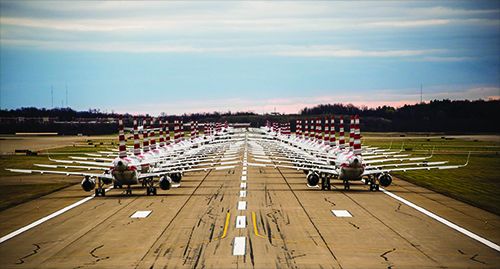What a year the last few weeks have been. The ongoing health crisis in the U.S. and throughout the world has upended the concepts of “normal” and “everyday life” for billions. As this was being written in late March, U.S. state and local jurisdictions were competing to put into place travel restrictions, business closures, stay-at-home orders and curfews, plus mandatory 14-day quarantines for people traveling from one state to another. It’s likely these and other restrictions will become more widespread, with unprecedented economic impacts.
If you’re like me, your social media is well-populated with images of parked airliners and empty airport terminals. Figures published by the Transportation Security Administration for the last Sunday in March 2020 show a 93-percent reduction in traveler throughput. And air travel is likely to become even less frequent in coming weeks. There’s no way to know how long this state of affairs will last, in part because there’s no consensus on the conditions to be met before things begin returning to “normal.” Societal upheavals like the Covid-19 pandemic don’t conform to anyone’s expectations of what the future will bring, or when.
We’re not health-care professionals, and we don’t play them on television, so we’re not going to hand out related advice. We simply urge you to pay attention to public health officials and any formal recommendations. Many of you may be in an essential line of work. Working pilots are in this group, but so are truck drivers, grocery-store clerks and, of course, the aforementioned health-care professionals, along with so many other occupations that help keep things running in a modern society. If you’re in one of these groups, thank you, and please be careful.
GROUNDING GA?
At least as far as the U.S. is concerned and the restrictions, if any, under which your community is operating, it’s not likely there will be a formal prohibition on general aviation operations. Without a political consensus or a flight safety-related reason, it’s unlikely the FAA would close any facilities since the value and utility of a functioning airport outweigh any risk to society it can pose, especially when considering potential responses to a health crisis.
As a general rule, only the FAA can close U.S. airspace or public airports. A state or local government generally cannot close a federally funded airport. That policy was reiterated by the FAA in March 2020 in a compliance guidance letter issued by the agency’s Office of Airport Compliance and Management Analysis. (See the Quick Turns item on page 22 for additional details.) The policy typically does not apply to private airports or those not accepting federal funding.
BUT WHERE WILL YOU GO?
So your local airport likely will be open for flight operations. In other words, it’s likely there’s no prohibition against flying your airplane, if you can get to it. Barring local stay-at-home orders, you can still go fly. But should you?
It’s impossible to maintain the recommended six feet/two meters of physical separation from someone while obtaining or providing flight instruction. And when was the last time your flying club’s 172 was thoroughly sanitized? Even if your local aviation businesses are operating, it may be impossible for you to continue flying as you have been while maintaining social distancing practices. Disregarding public health guidelines puts you, others near you and anyone you may come in contact with at greater risk for contracting the Covid-19 disease.
Solo flight doesn’t seem to pose any measurably greater infection risk, at least when compared to driving a car or motorcycle, operating a boat or ATV, or engaging in various other outdoor activities for individuals. But where will you go, and what will you do when you get there? If everything in the town served by your destination airport is shut down, there’s no $100 hamburger available.
Should you be flying in these times at all? On one hand, presume it’s just you and someone else known not to be infected. Presume also you have exclusive use of the aircraft and no one else needs to be involved. Getting to the aircraft doesn’t violate any formal restrictions or guidelines, and you have a legitimate, non-frivolous, personal or business reason for the flight (yes, you get to decide what’s frivolous). Can you fly? Sure; knock yourself out.
On the other hand, even if you meet all these tests, public admonitions to just stay home address more than health concerns. There have been a handful of ATC facility “brownouts” and outright closures so far in early 2020, creating additional stress on the system. The restrictions at your destination can change while you’re en route. If “something happens” and you need emergency services…well, good luck with that. Now is not the time to put additional strain on stretched-thin systems.
Even though personal aviation likely won’t be restricted on a large scale in coming weeks and months, there’s a strong undercurrent in these times that we’re all in this together. How we respond to these challenges will determine how long they last and what we’ll be left with at the end. With that in mind, we encourage you to just stay home and out of the cockpit. There’s nothing to be gained by asserting your privilege to fly in these times, and lots to lose if the court of public opinion decides against general aviation.
— Jeb Burnside




